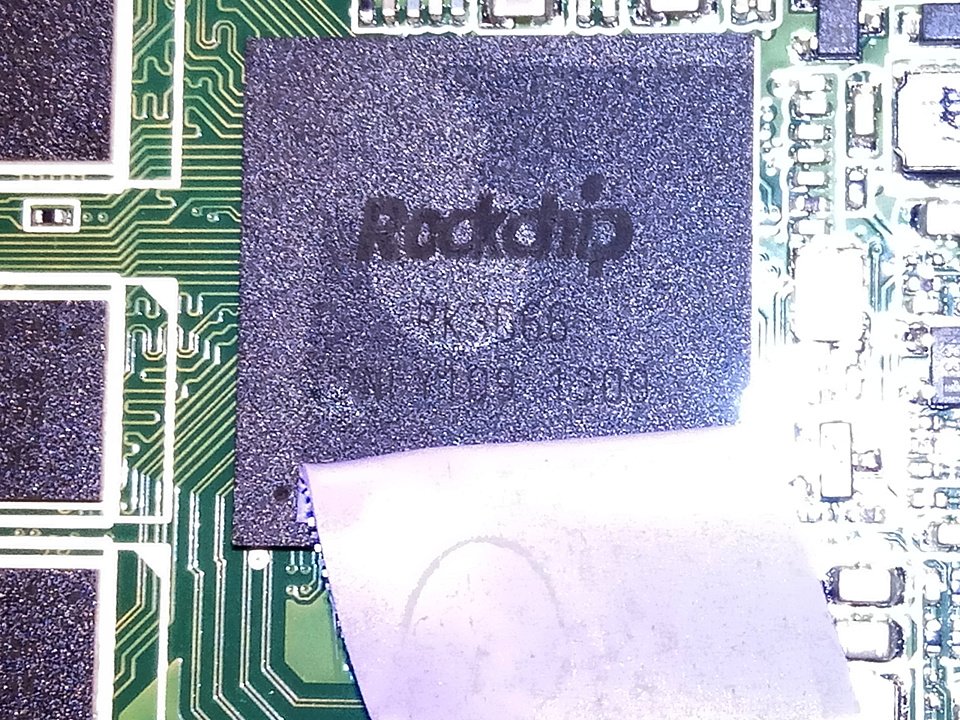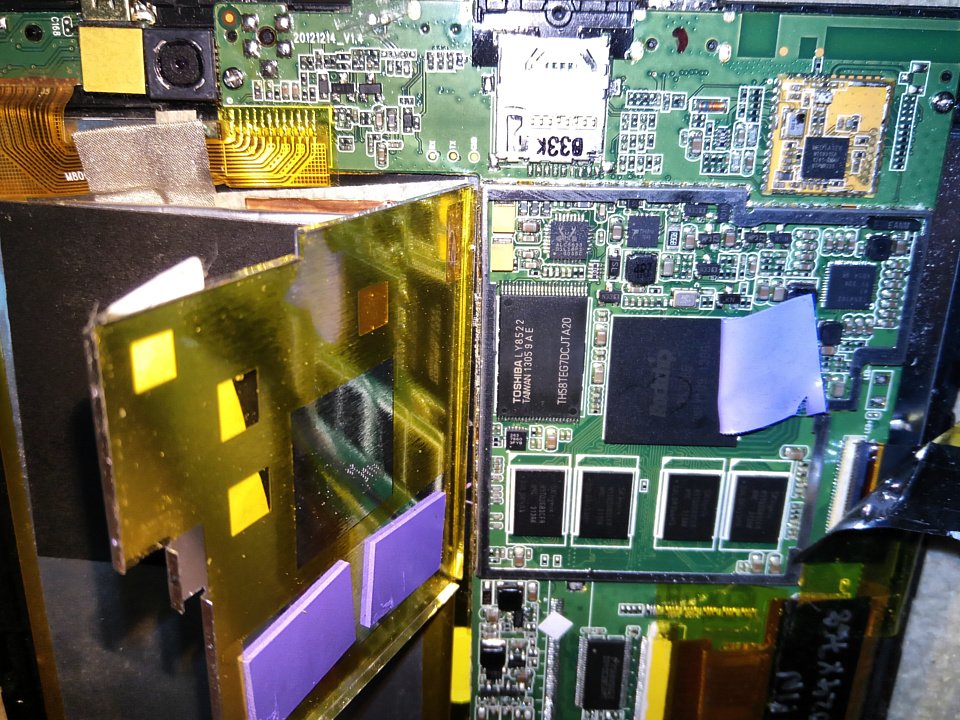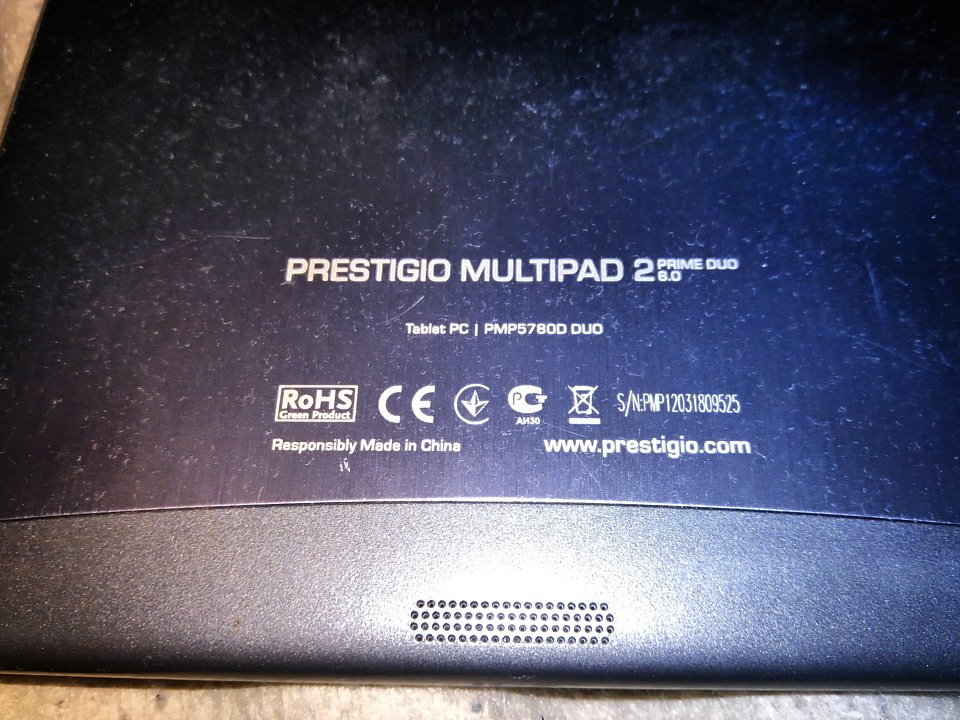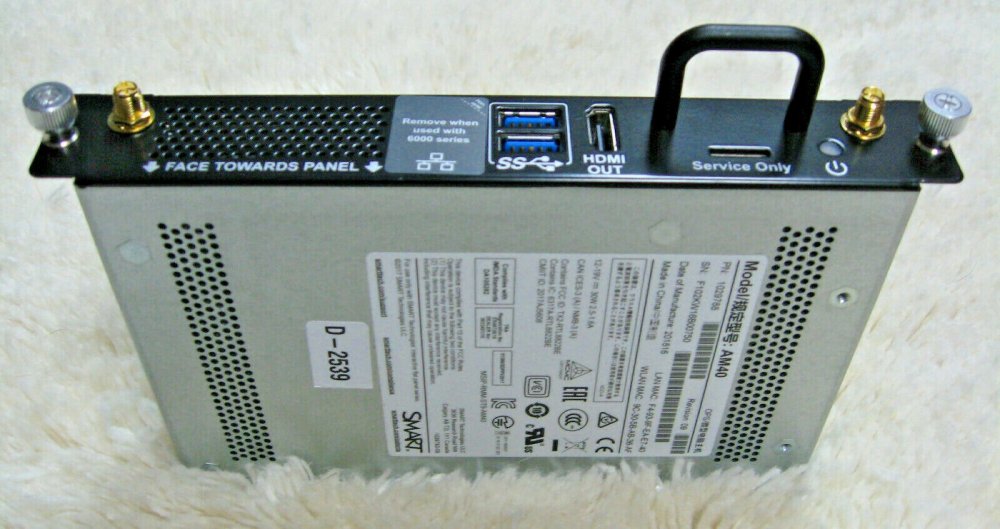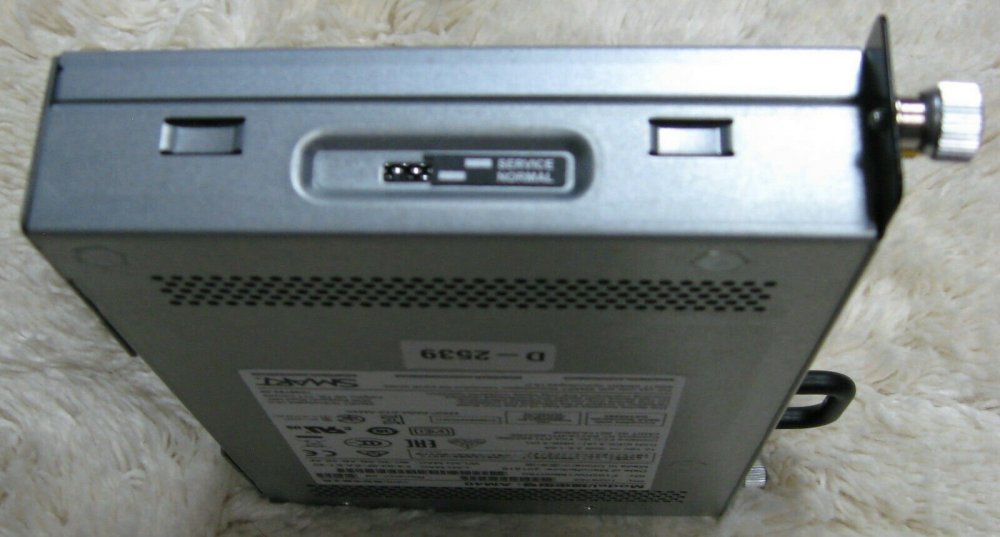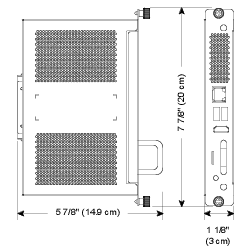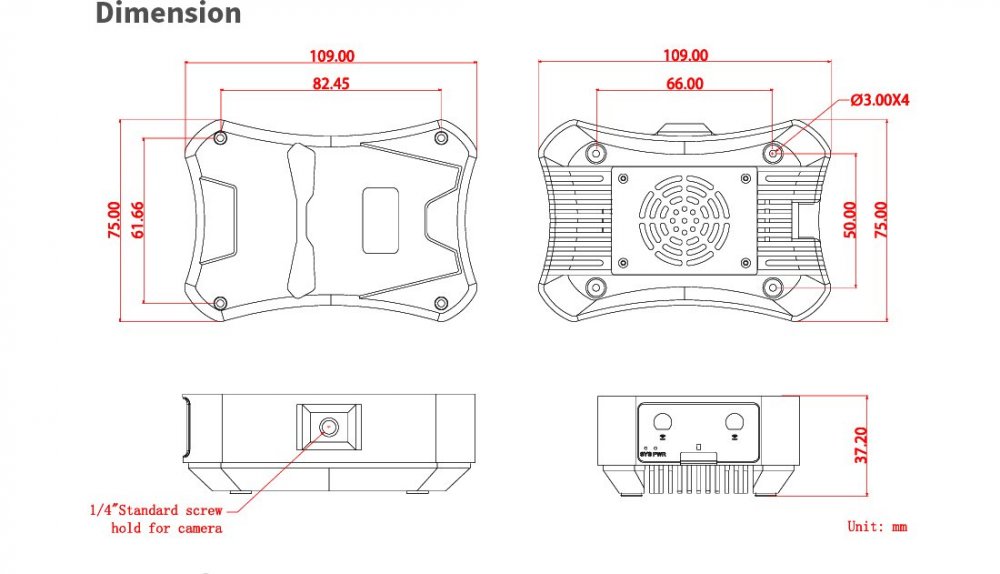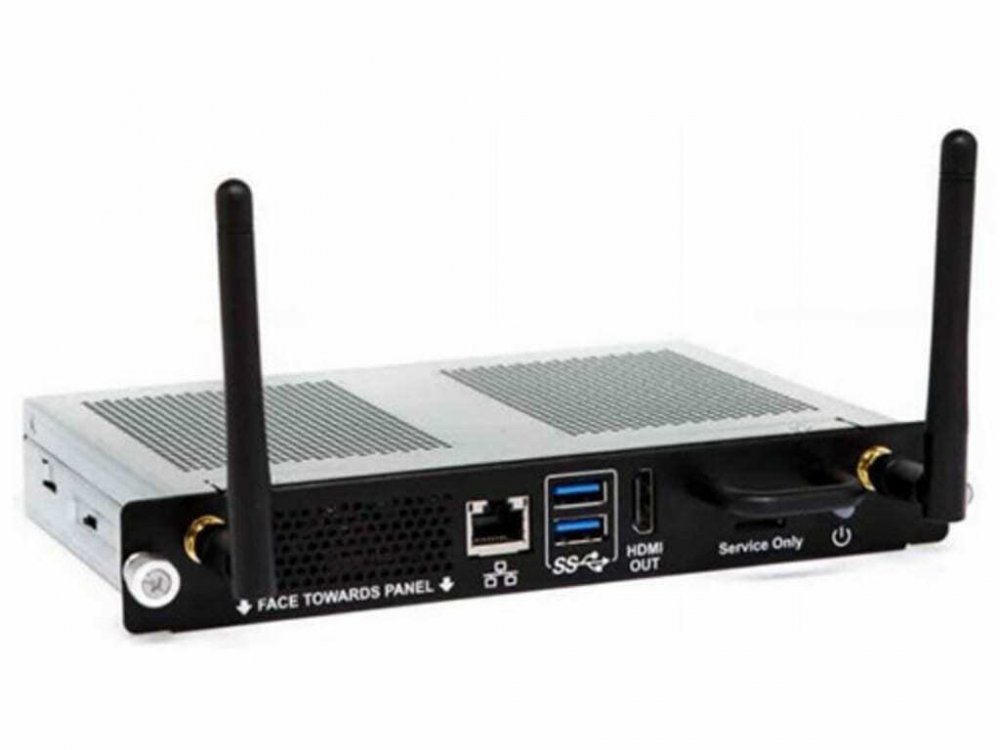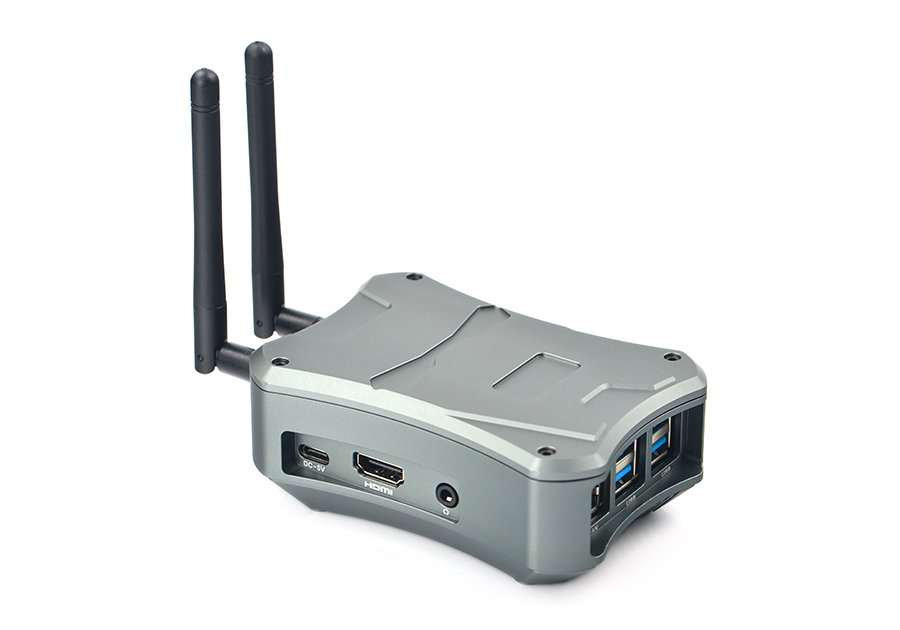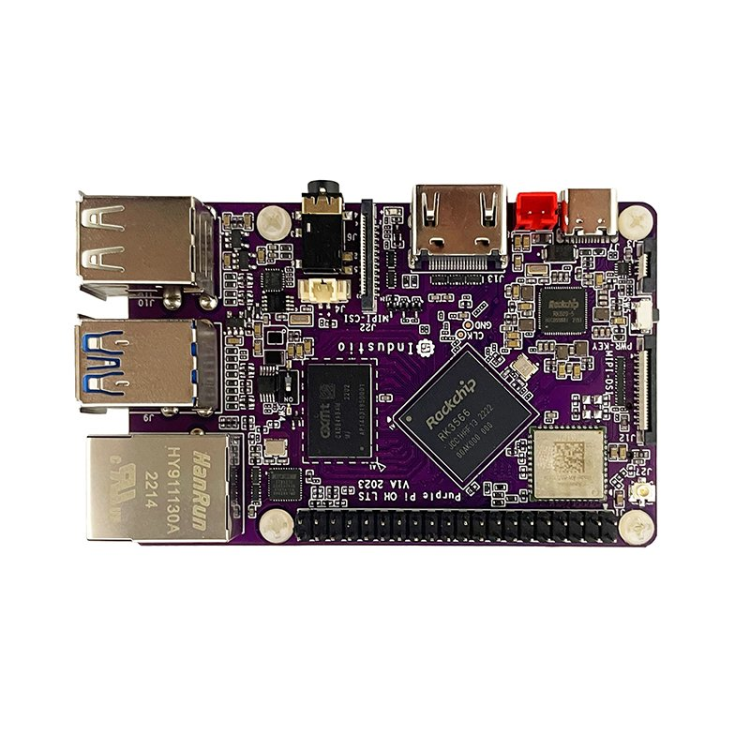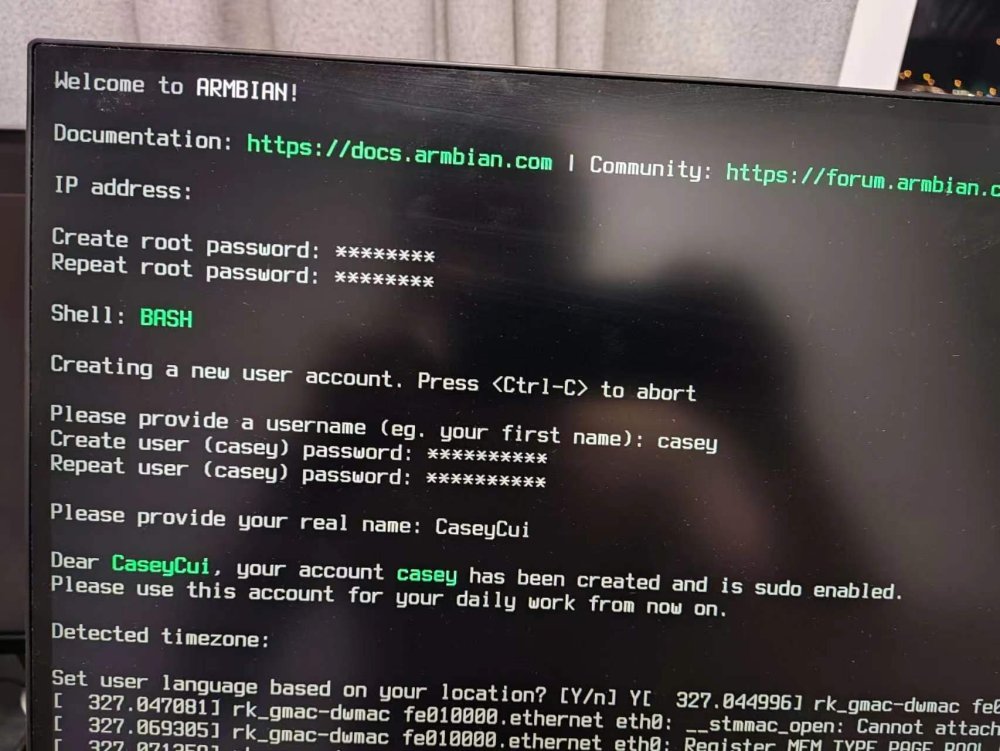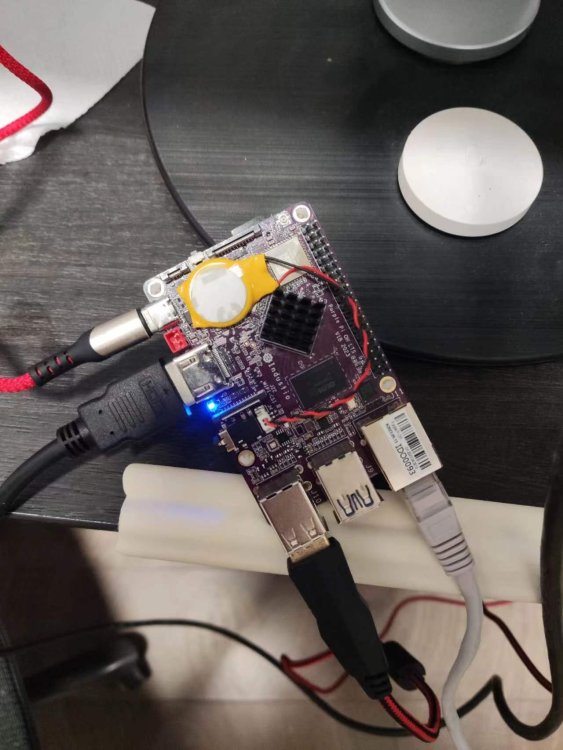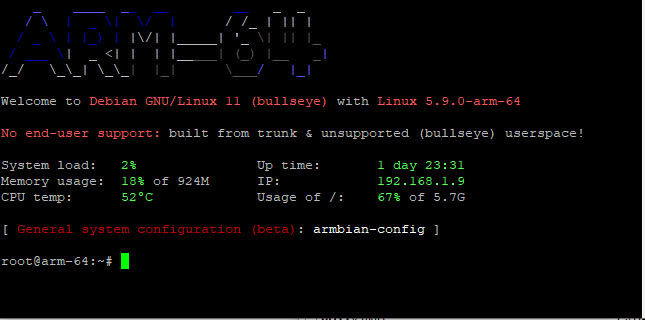Search the Community
Showing results for tags 'other'.
-
Hi all, I need to customize the /etc/fstab during the build to mount a mtd partition and also to override some mountpoints with tmpfs in order to reduce wearing on mmc. So, have added the following lines to customize-image.sh: cat <<EOT >> /etc/fstab # Reduce SD wearing by storing log files into ram (no need as overlayroot is used to freeze all the rootfs) tmpfs /tmp tmpfs defaults,noatime,nosuid,nodev 0 0 tmpfs /run tmpfs defaults,noatime,nosuid,nodev 0 0 tmpfs /var/tmp tmpfs defaults,noatime,nosuid,nodev 0 0 tmpfs /var/log tmpfs defaults,noatime,nosuid,nodev,noexec 0 0 tmpfs /var/lib/logrotate tmpfs defaults,noatime,nosuid,nodev,noexec,size=1m,mode=0755 0 0 tmpfs /var/lib/sudo tmpfs defaults,noatime,nosuid,nodev,noexec,size=1m,mode=0700 0 0 # MTD EEPROM memory dev/mtdblock0 /mnt/mtd jffs2 ro,relatime 0 0 EOT However changes in /etc/fstab are overridden somewhere over the build process, and this is the resulting /etc/fstab: UUID=c8167755-b557-4288-9109-9108bc48dd94 / btrfs defaults,noatime,commit=600 0 1 UUID=27ac6cc6-eff3-4736-a7bd-5517e3b150c0 /boot ext4 defaults,commit=600,errors=remount-ro 0 2 tmpfs /tmp tmpfs defaults,nosuid 0 0 Is there a way to safely patch the /etc/fstab file? Thanks very much! Andrea
- 3 replies
-
- Orange Pi Zero Plus
- Other/unspec
-
(and 1 more)
Tagged with:
-
Hello. I am wondering if anyone here has Xenomai working for Amlogic platforms? I'm particularly interested in applying Xenomai to Le Potato/Sweat Potato. According to them, Xenomai is current and working for the Amlogic S905X3 (Odroid C4), though I have failed to find any source, patches, or images for that board. As far as I can tell, aside from some minor performance improvements here and there, the Odroid C4's SoC layout is very comparable to what the Potato boards have. So I only expect minor changes, if anything, to go from that SoC to the Potato's SoC. Xenomai's own guide to porting the dovetail interface is pretty good; I'll do that if I have too. I'm just not trying to reinvent 80% of the wheel if I don't have to either. Not trying to get out of doing work, just doing it twice would be silly. Constructive comments most appreciated! 😄 (FYI, I'm not new to GNU/Linux, the cli, gcc, make, compiling in general, etc. etc. In fact, I have had a build system for Armbian up and running for months now, and can build functional images with it. I've even marginally contributed to Armbian. TL;DR: I won't need much hand holding, just help over one or two obstacles.)
-
after quite a few frustrating attempts to setup a built environment, fixing some issues, jumping over some hoops for the build, I managed to get to the 'starting point' of a build ./compile.sh [🌱] uuidgen not found [ uuidgen not installed yet ] [🌱] Using prebuilt Armbian image as base for 'ubuntu-jammy' [ DOCKER_ARMBIAN_BASE_IMAGE: ghcr.io/armbian/docker-armbian-build:armbian-ubuntu-jammy-latest ] [🌿] Docker info [ Docker 19.03.11 Kernel:4.12.14-lp151.28.91-default RAM:31.28GiB CPUs:8 OS:'openSUSE Leap 15.1' hostname 'snoopy1.internal' under 'Linux' - buildx:yes - loop-hacks:yes static-loops:no ] [🌱] Creating [ .dockerignore ] [🌱] Docker launcher [ enabling all extensions looking for Docker dependencies ] [🌱] Extension manager [ processed 27 Extension Methods calls and 82 Extension Method implementations ] [🌱] Adding rootfs encryption related packages [ cryptsetup cryptsetup-initramfs ] [🌱] Preparing rkdevflash host-side dependencies [ rkdevflash ] [🌱] Creating [ Dockerfile; FROM ghcr.io/armbian/docker-armbian-build:armbian-ubuntu-jammy-latest ] [🌱] Armbian docker image [ already exists: ghcr.io/armbian/docker-armbian-build:armbian-ubuntu-jammy-latest ] [🌱] Building [ Dockerfile via 'buildx build --progress=plain --load' ] [🔨] #0 building with "default" instance using docker driver [🔨] [🔨] #1 [internal] load build definition from Dockerfile [🔨] #1 transferring dockerfile: 2.12kB done ... [🔨] #6 [2/6] RUN echo "--> CACHE MISS IN DOCKERFILE: apt packages." && DEBIAN_FRONTEND=noninteractive apt-get -y update && DEBIAN_FRONTEND=noninteractive apt-get install -y --no-install-recommends bash git psmisc uuid-runtime bc binfmt-support bison libc6-dev make dpkg-dev gcc ca-certificates ccache cpio debootstrap device-tree-compiler dialog dirmngr dosfstools dwarves flex gawk gnupg gpg imagemagick jq kmod libbison-dev libelf-dev libfdt-dev libfile-fcntllock-perl libmpc-dev libfl-dev liblz4-tool libncurses-dev libssl-dev libusb-1.0-0-dev linux-base locales lsof ncurses-base ncurses-term ntpdate patchutils pkg-config pv qemu-user-static rsync swig u-boot-tools udev uuid-dev zlib1g-dev file tree expect colorized-logs unzip zip pigz xz-utils pbzip2 lzop zstd parted gdisk fdisk aria2 curl wget axel parallel python3-dev python3-distutils python3-setuptools python3-pip python2 python2-dev gcc-x86-64-linux-gnu gcc-aarch64-linux-gnu gcc-arm-linux-gnueabihf gcc-arm-linux-gnueabi gcc-riscv64-linux-gnu debian-archive-keyring libc6-amd64-cross g++-aarch64-linux-gnu g++ btrfs-progs cryptsetup openssh-client f2fs-tools nilfs-tools xfsprogs zerofree qemu-utils qemu-utils libudev-dev libusb-1.0-0-dev dh-autoreconf build-essential gcc-arm-linux-gnueabi gcc-or1k-elf qemu-utils [🔨] #6 0.958 --> CACHE MISS IN DOCKERFILE: apt packages. [🔨] #6 49.04 Ign:1 http://archive.ubuntu.com/ubuntu jammy InRelease [🔨] #6 49.04 Ign:2 http://security.ubuntu.com/ubuntu jammy-security InRelease [🔨] #6 97.09 Ign:3 http://archive.ubuntu.com/ubuntu jammy-updates InRelease ... [🔨] #6 200.2 Err:2 http://security.ubuntu.com/ubuntu jammy-security InRelease [🔨] #6 200.2 Temporary failure resolving 'security.ubuntu.com' ... [🔨] #6 481.5 Err:1 http://archive.ubuntu.com/ubuntu jammy InRelease [🔨] #6 481.5 Temporary failure resolving 'archive.ubuntu.com' [🔨] #6 529.5 Err:3 http://archive.ubuntu.com/ubuntu jammy-updates InRelease [🔨] #6 529.5 Temporary failure resolving 'archive.ubuntu.com' Is anyone else encountering a similar issue? The builds seemed to be failing repeatedly at DNS resolution to the repositories. Didn't manage to get past this point as the builds failed repeatedly here many minutes to like 1/2 hour and abort, many times with no successes so far. They also seem to be the same few accesses and possibly packages. [🔨] #6 481.4 Err:1 http://archive.ubuntu.com/ubuntu jammy InRelease [🔨] #6 481.4 Temporary failure resolving 'archive.ubuntu.com' [🔨] #6 529.4 Err:3 http://archive.ubuntu.com/ubuntu jammy-updates InRelease [🔨] #6 529.4 Temporary failure resolving 'archive.ubuntu.com' [🔨] #6 577.5 Err:4 http://archive.ubuntu.com/ubuntu jammy-backports InRelease [🔨] #6 577.5 Temporary failure resolving 'archive.ubuntu.com' [🔨] #6 577.5 Reading package lists... [🔨] #6 578.1 W: Failed to fetch http://archive.ubuntu.com/ubuntu/dists/jammy/InRelease Temporary failure resolving 'archive.ubuntu.com' [🔨] #6 578.1 W: Failed to fetch http://archive.ubuntu.com/ubuntu/dists/jammy-updates/InRelease Temporary failure resolving 'archive.ubuntu.com' [🔨] #6 578.1 W: Failed to fetch http://archive.ubuntu.com/ubuntu/dists/jammy-backports/InRelease Temporary failure resolving 'archive.ubuntu.com' [🔨] #6 578.1 W: Failed to fetch http://security.ubuntu.com/ubuntu/dists/jammy-security/InRelease Temporary failure resolving 'security.ubuntu.com' [🔨] #6 578.1 W: Some index files failed to download. They have been ignored, or old ones used instead.
-
While doing the build, I initially ran into various NO_PUBKEY ... error messages accessing security.ubuntu.com, archive.ubuntu.com repositories. e.g. [🔨] 3.570 W: http://archive.ubuntu.com/ubuntu/dists/jammy-backports/InRelease: The key(s) in the keyring /etc/apt/trusted.gpg.d/ubuntu-keyring-2018-archive.gpg are ignored as the file is not readable by user '_apt' executing apt-key. [🔨] 3.570 W: An error occurred during the signature verification. The repository is not updated and the previous index files will be used. GPG error: http://archive.ubuntu.com/ubuntu jammy-backports InRelease: The following signatures couldn't be verified because the public key is not available: NO_PUBKEY 871920D1991BC93C [🔨] 3.570 W: Failed to fetch http://archive.ubuntu.com/ubuntu/dists/jammy/InRelease The following signatures couldn't be verified because the public key is not available: NO_PUBKEY 871920D1991BC93C [🔨] 3.570 W: Failed to fetch http://archive.ubuntu.com/ubuntu/dists/jammy-updates/InRelease The following signatures couldn't be verified because the public key is not available: NO_PUBKEY 871920D1991BC93C [🔨] 3.570 W: Failed to fetch http://archive.ubuntu.com/ubuntu/dists/jammy-backports/InRelease The following signatures couldn't be verified because the public key is not available: NO_PUBKEY 871920D1991BC93C [🔨] 3.570 W: Failed to fetch http://security.ubuntu.com/ubuntu/dists/jammy-security/InRelease The following signatures couldn't be verified because the public key is not available: NO_PUBKEY 871920D1991BC93C it turns out the reply in this post resolves the issue https://askubuntu.com/questions/13065/how-do-i-fix-the-gpg-error-no-pubkey Those using a system installed from the most recent Ubuntu DVD images probably wouldn't hit the issue. But that if you are using an older distribution or that you are trying a build from a distribution other than Ubuntu, this may fix the issue and help 'jump the hoop'.
-
Hello, I'm looking for armbian 23.8.1 repository on github for building my own image. On github site there is on only the latest and after the 23.08 is more recent one. So where can i download the branche 23.8.1 ?
-
Support for IndieDroid Nova?
-
I started seeing this happen "now and then" a couple of months ago, but over the last month it has gone to "multiple times a day". It's not always the same mirror. Frequently it's the airframes.io mirrors, this morning it was lv.auroradev.org The pattern is usually like this: Err:1 https://armbian.lv.auroradev.org/apt bookworm/main arm64 linux-libc-dev arm64 23.02.2 404 Not Found [IP: 23.186.113.5 443] E: Failed to fetch https://armbian.lv.auroradev.org/apt/pool/main/l/linux-6.1.11-sunxi64/linux-libc-dev_23.02.2_arm64.deb 404 Not Found [IP: 23.186.113.5 443] Is there a place to report these issues to get those mirrors fixed?
-
I was cleaning storage room of customer and found this device in sealed box. Owner of the box say it was rarely used and i can keep it. Only thing broken was the battery. I replaced it temporarily with unused smartphone one. The device boots and is almost new condition. SoC RK3066 = (ARM Cortex-A9 Dual-Core @ 1.6Ghz + ARM Mali400MP4) RAM 1GB = (Four Chips on image are Hynix [H5TQ2G83CFR-H9C] -2gb) Storage 16GB = (Toshiba TH58TEG7DCJTA20 - Nand Flash MLC 16GB) Uart RX/TX pads on board I make this topic as i want to ask more experienced people here if this SoC can run "some" version of Armbian. Thank you in advance
-
I have a unique hardware setup with an ARMv8 architecture but a 32-bit 'armeabi-v7a' ABI. My goal is to install a 64-bit operating Ambian (or others, even a 64 bit Android Go if possible) system on this hardware, replacing the existing 32-bit setup. The device is a kids tablet ZIDS701 by Trayoo. The current OS is Android Go 10 32-bit. I'm kind of a newbie to firmware, so I'm reaching out to the knowledgeable members of this community for guidance and assistance in achieving this. I'm particularly interested in recommendations for a 64-bit OS that would be compatible with this setup and any steps or considerations I should be aware of during the installation process. Much appreciated thank you.
-
Armbian 22.05.0-trunk with bleeding edge Linux 5.16.20-rockchip64 my armbian runs on a MKS SKIPR motherboard for a 3d printer. Since I updated the system, I can no longer change any files. I change it but after a restart the file is back as it was.since i have updated the system for example this file nano /etc/resolv.conf After saving and restarting everything is as it was. no matter whether as root or user Is there a setting that prevents or reverses changes?
-
SMART AM40 iQ Appliance P/N: 1031572 Model: UGK-AM40-EDU | EWY1-AM40-EDU | EWY2-AM40-EDU Processor RK3399, Dual-core A72+Quad-core A53, 64 bits, 2GHz Memory 4 GB DDR3L SDRAM Storage 32 GB eMMC 5.1 Wireless technology Bluetooth 4.1 802.11A/B/G/N/Ac Capture options Establish a Bluetooth wireless connection with a supported mobile device Connectors HDMI 1.4 (1920 × 1080) output for external monitor USB 3.0 Type-A (×2) RJ45 Gigabit Ethernet --Update-- For device tear-down and technical sheets included in package - SEE SECOND POST Reference links posted at bottom are sourced as I dig up more details that may be useful . It looks like the power will have to be supplied via gpio as far as I can tell.. The official documentation and fccid technical orders refer to the Headless SBC / Module what have you; as an "IQ Appliance". Tagged 'grep' for control/command function searching through fccid or other official documentation) Otherwise found simply as AM40 rk3399 or AM40 iq on google/other engines --AM40 iQ - Anyone seen or attempted armbian on something similar?-- Figured this forum may be one of the few places that might appreciate and see what I first saw. So if anyone might have an idea where to proceed with a possible hidden gem like this.. I picked it up for reasonable price a quite a bit LESS than current nanopi m4 cost the other night. Can't say quite yet if it will be a useless paperweight, or a diamond in the rockchip. heh. As soon as it arrives I intend on seeing what kind of hac.. err educational research can be done to place Armbian on it eventually over its intended OS. There seems to be a service switch that is used on other models to allow intel modules and windows OS. The form factor seems to be carrier board size, so here's hoping for that switch to be more open to source than intended for this particular model. It's just something about the specs on it raised an eyebrow, yea? And the case it comes with is pretty solid compared to the shit, err, other case and fan combos you normally see.. That alone.. I didn't see any tear-down from the ffcid schematics available to the public, possibly because it sold as an education exclusive device to school system. If anyone here shows interest, I'd be glad to do a tear-down (bubba do like destroy) and share it with the RK3399 community. -Follow up- Regarding cost. I paid somewhere under $50. If anyone else considers it, I suggest you be firm with the seller, and make an offer that is well under what they're going to be asking. Reason to be a cheapskate on these things? Well.. 1. Likely these were paid for by government tax funds for schools. Or written off as a privately owned business cost anyhow, which means someone like us already helped pay for them.. In the form of tax or tax return budget allotted to business owners. 2. Considering I'm not even sure if its possible to power on so simply without gpio testing or a breakout wizard beard 3. Cause we can build this things ourselves already for under $100 easily. So yea don't pay something more than that, even brand new for sure! Open Power Specification and 2 pins in the back is all I see so far. Ebay: https://www.ebay.com/itm/SMART-Model-AM40-Part-Number-1029788-Rev-07-No-Antennae-Very-Good-Condition/174156468137?hash=item288c88cfa9:g:DvwAAOSwCRVdcQyW https://www.ebay.com/itm/NEW-SMART-iQ-Appliance-AM40-Education-Digital-Signage-Player-Rockchip-RK3399/173853101572?hash=item287a73ce04:g:AccAAOSwaAlccc2l Manufacturer Reference: https://support.smarttech.com/docs/software/iq/en/about/specifications/am40.cshtml https://support.smarttech.com/docs/software/iq/en/about/iq-appliance-connectors.cshtml FCCID Technical Orders: doesn't seem to have its own nomenclature listing however, it is referenced in great detail its carrier device (an over priced touch screen) sourced for IMPORTANT notes before any reversing or mod attempt at introducing hardware compatible touch screen, PSU, OPS (serial) etc user manual control/command function search 'grep AM40' FCC ID QCIIDS665P1 QCI-IDS665P1, QCI IDS665P1, QCIIDS665P1, QCIIDS665PI, QCI1DS665P1, QCIID5665P1, QCIIDS66SP1, QC11DS665P1, OCIIDS665P1, 0CIIDS665P1 SMART Technologies Inc. SMART Board 6000S and 6000S Pro Series Interactive Displays IDS665P1 SMART LCD Monitor SBID-6065S, IDS665-1 Smartboard Interactive Display 6000S / Pro SBID-6265S, SBID-6275S, SBID-6265S-PW, SBID-6275S-PW https://fccid.io/QCIIDS675P1 https://fccid.io/QCIIDS675P1/Users-Manual/User-Manual-4554712 FCC ID QCI7086 QCI-7086, QCI 7086, QCI7086, QCI7O86, QC17086, OCI7086, 0CI7086 SMART Technologies Inc. Interactive Display 7086 https://fccid.io/QCI7086 https://fccid.io/QCI7086/User-Manual/Users-Manual-3626573 https://fccid.io/QCI7086/Internal-Photos/Internal-Photos-3626563 user manual control/command function search 'grep iQ appliance' FCC ID QCI7000 QCI-7000, QCI 7000, QCI7000, QCI7OOO, QC17000, OCI7000, 0CI7000 SMART Technologies Inc. Interactive Display 7000 https://fccid.io/QCI7000 https://fccid.io/QCI7000/Users-Manual/user-manual-3417295 https://fccid.io/QCI7086/Internal-Photos/Internal-Photos-3417295 OPS: Open Plug-gable Specification Serial (40 pin) Seria(40 pin) = OPS (80 pin *note, not sure exactly if this is the way to go, but closest I could find for now to adapt the OPS interface manufacturers "support" forum search regarding ops https://community.smarttech.com/s/global-search/OPS?language=en_US A Challenger Appears https://hackaday.io/project/20193-open-pluggable-specification-breakout-board https://www.digikey.com.au/products/en/connectors-interconnects/rectangular-board-to-board-connectors-arrays-edge-type-mezzanine/308?k=tx24&k=&pkeyword=tx24&s=54162&pv1989=0&FV=ffe00134&mnonly=0&newproducts=0&ColumnSort=0&page=1&quantity=0&ptm=0&fid=0&pageSize=25 OPS: Open Plug-gable Specification potentially an inconvenient convenience. (hdmi,usb,rj45 and etc..) to make the platform a module. imagine your favorite usb to serial, or whatever favorite debugging i/o. Now, chop off the USB part, and replace it with this. heres hoping those 2 pins are simple logic level voltage and ground Service Switch: Possibly switches between EMMC and SD Boot? May be interesting TLDR; possibly epic fail or epic win used condition: metal case / fan / rk3399 / 4GBDDR3 / 32GB EMMC vs NanoPi M4 Metal Case w/ Cooling Fan $30 to $45 Metal Case with Cooling Fan and RK3399/4GBDDR3/32GB eMMC $35 to $100
-
I don't know if this is the right subforum for this question. Would Armbian be possible for the PineTab2?
-
I'm trying to get the armbian x86-64 generic image to run in virtualbox. I can successfully convert the *.img file to qcow2 and qemu will run it just fine. However, virtualbox fails to boot it in any format (qcow2, vmdk, vhd, vdi, etc). The grub menu comes up, but when trying to boot Linux then it just sits at a blinking cursor. I've tried converting this a variety of ways, such as using `qemu-img convert`, `vboxmanage convertfromraw` and `vboxmanage convertdd`. None of them yield an image that virtualbox will boot. Has anybody else had success with this, and/or know how to fix it? Thanks.
-
Hello friends, I apologize for such a noob question, but I was not able to find the answer in the forums, nor via duckduckgo. Since the 23.08 upgrades were released (thank you again to team Armbian!), I noticed that the "default" image for the Orange Pi 3 LTS is Armbian 23.8 Bookworm. The minimal CLI image weighs in at 267Mb. My OPi3LTS SBCs are all running Armbian Jammy 23.08. The minimal CLI image weighs in at 195Mb. My understanding is that Jammy is Ubuntu (22.04.3 LTS), and Bookworm is Debian (12.0). But also Ubuntu Jammy is based on Debian Bookworm/sid. My questions are as follows: 1. What goes into the decision to designate one or the other as the default (ie. listed in the hero section - above the "other supported variants")? 2. What constitutes the 72Mb difference between the images? 3. Other than obvious software incompatibility (ie. software requires either Ubuntu or Debian), what does one lose by moving from Jammy to Bookworm? 4. How does one upgrade to Armbian 23.8 Bookworm Minimal CLI from Armbian 23.8 Jammy Minimal CLI - without reformatting? Thank you team Armbian for all of your heroic efforts! Best Regards.
-
I've set up 23.02 Debian Bullseye CLI on my Orange Pi 5. I believe I read 23.05 is coming out soon. Would I just do an apt update and then apt upgrade to make the change? I'm at the point where I could just re-install and start with 23.05 but what would I do in the future for new updates? Thanks.
-
I would like to use a CI service to build Armbian images, ideally BitBucket pipelines since that is where most of my projects are. Has anyone had any success doing something similar? I thought it would be easy since docker based builds are supported, but it seems the supported technique is to run a command on the host that starts a separate docker container. Most CI build now are already running in a container and while I think running docker inside docker is possible, I have not been able to get that to work well in the past.
-

How to install Armbian on a Netgate SG-2100 (mvebu_armada-37xx)?
Saitama posted a question in Other families
Wondering if it is possible to replace pfsense (freebsd 14) with Armbian on a netgate sg-2100 appliance? https://shop.telappliant.com/product/sg-2100-pfsense-security-gateway-appliance/ I have the version with an additional 32GB M.2 SSD and it looks like the mvebu_armada-37xx board is supported by the generic Armbian, but I struggle to get from u-boot to starting the installer from usb (used the Armbian_23.5.1_Uefi-arm64_bookworm_current_6.1.30_minimal.img), with the usbboot command. Below is the current u-boot environment. I have masked some parts with "xxxxx" and probably won't need half of these variables, as they are very vendor specific, for example netgateid etc. If possible, I would like to flash/replace the boot loader that is not specific for pfsense, but I am a total beginner with arm boards and boot loaders. Not as easy as installing various Linux distros... Marvell>> printenv arch=arm baudrate=115200 board=mvebu_armada-37xx board_name=mvebu_armada-37xx boot_file=efi/boot/bootaa64.efi bootcmd=run setLED; run mmcboot; run scsiboot; run usbboot; run net; bootdelay=2 cpu=armv8 dmi_board_mfg=Silicom dmi_board_name=xxxxxxxx dmi_board_serial=xxxxxxxx dmi_board_ver=R301 dmi_chassis_mfg=Silicom dmi_chassis_serial=xxxxxxxx dmi_chassis_ver=R301 dmi_sys_mfg=Silicom dmi_sys_name=SG-2100 dmi_sys_serial=xxxxxxxx dmi_sys_ver=R301 dtb_name=armada-3720-sg2100.dtb eth1addr=xxxxxxxx ethact=neta@xxxxxxxx ethaddr=xxxxxxxx ethprime=eth0 fdt_addr_r=0xc00000 fdtcontroladdr=7f623360 gatewayip=xxxxxxxx ipaddr=0.0.0.0 kernel_addr_r=0x1000000 load_dev=usb loadaddr=0x1000000 mmcboot=mmc rescan; setenv load_dev mmc; if fatls ${load_dev} 0:2 /; then run pfsenseboot; fi; net=dhcp; tftp ${fdt_addr_r} ${dtb_name}; tftp ${kernel_addr_r} loader.efi; fdt addr ${fdt_addr_r}; fdt set / sn ${dmi_sys_serial}; bootefi ${kernel_addr_r} ${fdt_addr_r}; netgateid=xxxxxxxx netmask=255.255.255.0 pfsenseboot=load ${load_dev} 0:2 ${fdt_addr_r} ${dtb_name}; load ${load_dev} 0:1 ${kernel_addr_r} ${boot_file}; fdt addr ${fdt_addr_r}; fdt set / sn ${dmi_sys_serial}; bootefi ${kernel_addr_r} ${fdt_addr_r}; pxefile_addr_r=0x2000 ramdisk_addr_r=0x2000000 rootpath=/srv/nfs/ scsiboot=scsi reset; setenv load_dev scsi; if fatls ${load_dev} 0:2 /; then run pfsenseboot; fi; serverip=0.0.0.0 setLED=i2c dev 1; i2c reset; i2c mw 67 ff 0; i2c mw 67 0 1; i2c mw 67 f 20; i2c mw 67 3 40; i2c mw 67 26 0; i2c mw 67 10 0; soc=mvebu stderr=serial@12000 stdin=serial@12000 stdout=serial@12000 usb_pgood_delay=4000 usbboot=usb reset; setenv load_dev usb; if fatls ${load_dev} 0:2 /; then run pfsenseboot; fi; usbrecovery=mmc erase 0 400000; run usbboot vendor=Marvell -
Hello everyone, I'm new user about SBC and armbian. I recently purchased this SBC - purple-pi-oh (rk3566, Number/type of interfaces similar to Raspberry Pi), It has opened up its linux sdk and more. Because its default image version is older, and does not support k3s, cilium, etc (I'm a k8s ops), so I want to use armbian with it. I first directly downloaded and tried all rk3566/3568 images of other SBCs, such as station m2/station p2/Bananapir2pro, etc., and the most pleasant surprise was that using the station m2 image, purple pi oh almost works (can run through the installation process, mouse/keyboard/hdmi monitor works fine), the only regret is that the network card activation error, can not run properly. (It's so close.) △ The only problem, eth0 failed to activate. I am trying to build a custom image of Armbian for the purple pi oh, but I really don't have any relevant experience in this area. Can any of the experts guide me please? My simple idea is that, based on the station m2 situation, maybe with a few tweaks to the configuration, the rebuilt image will work perfectly fine. Thank you! Finally, English is not my first language, so I'm slower to read/comprehend and reply.
-
How can I access individual packages that make up the images that are available for download e.g. at https://www.armbian.com/lenovo-x13s/ ? I see only "full image" downloads and no link to information on what was used to build these images. I poked around the dists named "bookworm something" on apt.armbian.com looking for the kernel used, but didn't find any obvious match (no 6.3 kernel version, no kernel that has "x13s" in the package name, ...). Likewise, there is no x13s listed in https://github.com/armbian/build/tree/master/config/sources/families
-
i have already install pihole + unbound on this device now i want to reset everything so i can make a new project on it because of the limitation on storage.. can i know how to do that? and without change any kernel/firmware i'm beginner on linux ecosystem...
-
I found what a likely duplicate out-of-tree driver after investigating a warning from the kernel build: CC [M] drivers/gpu/drm/panel/panel-simple-dsi.o drivers/gpu/drm/panel/panel-simple-dsi.c: In function 'panel_simple_get_modes': drivers/gpu/drm/panel/panel-simple-dsi.c:310:73: warning: passing argument 3 of 'of_get_drm_display_mode' makes pointer from integer without a cast [-Wint-conversion] 310 | ret = of_get_drm_display_mode(panel->dev->of_node, mode, p->desc->bus_format, | ~~~~~~~^~~~~~~~of_get_drm_display_mode~~~~ | | | u32 {aka unsigned int} In file included from ./include/drm/drm_crtc.h:32, from drivers/gpu/drm/panel/panel-simple-dsi.c:13: ./include/drm/drm_modes.h:509:66: note: expected 'u32 *' {aka 'unsigned int *'} but argument is of type 'u32' {aka 'unsigned int'} 509 | struct drm_display_mode *dmode, u32 *bus_flags, | ~~~~~^~~~~~~~~ This code cannot work as is and a fix would be to add the missing ampersand before the p->desc->bus_format. Still other warning surface when this is fixed. This driver calls of_get_drm_display_mode against bus_format while panel-simple does against bus_flags (it also has bus_format but it passes it as an argument to drm_display_info_set_bus_formats). So it might well be that the driver would pass the wrong arguments. It has no documentation for its DTS parameters so it is hard to tell if bus_format should be set as bus_flags from the panel-simple documentation or if its user will end up sending bus_format as a bus_flags. There is already a dsi driver in upstream drivers/gpu/drm/panel/panel-simple.c (panel-dsi-simple while this one is panel-simple-dsi). So I wonder if there is a use in shipping two drivers for the same purpose. And there are no dts users of this out-of-tree driver panel-simple-dsi. The discussion about its introduction is in: https://github.com/armbian/build/pull/3140 It is told in the commit log to be a port of a rockchip kernel 4.4 driver, but panel-simple has dsi probe since v3.14. I am puzzled rockchip forked panel-simple instead of expanding it. Rockchip.DRM.Panel.Porting.Guide.pdf has no mention of the bus_format dts parameter so maybe this code path was never used and the buggy code affects no users. (a few dts parameters in the rockchip code are also not documented in this PDF). @iamdrq you are the author of this driver. Was there code missing in the dis support of panel-simple.c for dsi support, ie is panel-simple-dsi necessary? Was the aim to have a version of the panel dsi code that is bit-to-bit compatible with the rockchip kernel, so no porting was necessary? If features were missing could we bake them into the panel-simple.c driver (so they could be tested and one day be upstreamed)?
-
Hi guys, which is the Armbian recommended way to jump to a newer Userspace version? A fresh install ? A regular system upgrade ? Thanks in advance, 🙏 F.
-
On X86 and AMD64 systems they all have either the UEFI bios or the old bios. I don't know what the Raspberry Pi uses but I don't think it's UEFI. Do any of the ARM systems use UEFI? How does Armbian boot on the non-UEFI systems?
-
Hi, i've a tablet that has an Allwinner A20 socs. Can i install armbian? Which are installation steps? Thank You Luigi



